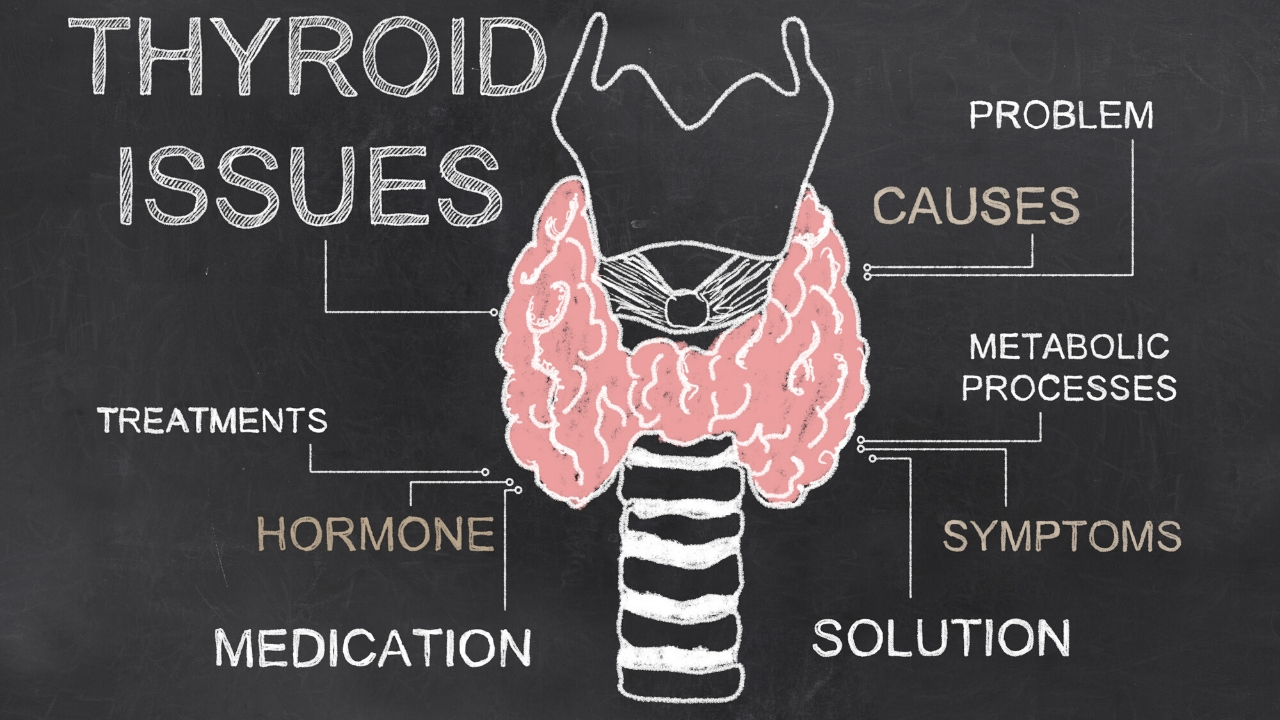Hyperthyroidism (or thyrotoxicosis) is a hypermetabolic state of elevated levels of thyroid hormone (T4 and T3) in the body.
Etiology
There are several causes of this condition. the main causes are:
- Graves disease, an autoimmune disease most common in females, in which thyroid hormone secretion is stimulated by auto-antibodies (long-acting thyroid stimulating antibodies, or LATS), which latch onto the TSH receptor sites and mimic TSH stimulation. There is diffuse hyperplasia (too much thyroid hormone) of the thyroid. This condition can lead to other inflammatory conditions in the body including ptosis of the eyes which is a fatty infiltration into the extrinsic muscles of the eye.
- Toxic thyroid adenoma, can be a cause of hyperthyroidism as the tumour excretes T3 and T4 hormones.
- Toxic nodular goiter, a glandular enlargement which triggers intense hormone formation. This is usually seen in people over fifty years old who have had a non-toxic goiter for many years. These individuals may show symptoms of cardiac arrhythmia or failure.
- Another cause can be thyroid hormone-secreting tumours in the ovaries or pituitary gland.
- Ingesting exogenous thyroid hormone can lead to too much thyroid hormones present in the body.
- Excess pituitary TSH or hypothalamic TRH secretion (often pituitary tumours are a cause of this).
SIgns and Symptoms
Several tests will be done along with bloodwork to determine your thyroid levels, heart rate, size of thyroid, etc. Signs or symptoms of this condition are excess T3 and T4 hormones which lead to a fast metabolism often accompanied by tremors, weight loss (lose weight even though you’re eating a lot), tiredness and weakness but also restlessness, sweating, diarrhea, anxiety and emotional instability. Often you will also see a rapid pulse, arrhythmia’s and eventually heart failure if the condition is not corrected. Because the thyroid regulates calcium uptake in the body, osteoporosis and increased calcium excretion in the urine can occur. Excess thyroid hormone results in increased basal metabolic rate and over-activity of the sympathetic nervous system.
Doctors use the term thyroid storm to describe an acute onset of severe hypothyroidism. This is a medical emergency and can lead to death caused by heart rhythm problems.
Diet Recommendations
- Avoid caffeine, stimulants and carbonated beverages
- Avoid sugar, alcohol, MSG and artificial sweeteners
- Drink at least 10-12 glasses of water (herbal counts towards this) per day
- Increase fibre intake, including soluble fiber (chia, ground flax, veggies)
- Avoid processed and hydrogenated fats (vegetable oils, vegan butter, etc)
- Minimize consumption of refined and simple carbs (gluten, cereal, white potato, etc)
- Eat an alkaline diet (high in fruits, vegetables, wild caught seafood, healthy fats and fiber)
- Consume plenty of goitrogens
- Goitrogens are naturally-occurring substances found in foods that block the absorption and utilization of iodine
- High goitrogenic foods are raw brassica vegetables (mustard family) such as broccoli, brussel sprouts, cabbage, and cauliflower. Heat destroys their goitrogenic action so they must be consumed raw. Shaving them into salads is delicious!
- Soy foods are also goitrogenic
- Avoid high iodine foods
- Avoid foods you have sensitivities or allergies to
- Make sure to consume plenty of protein (both animal and protein sources)
Supplement Recommendations
- Probiotics
- Multivitamin-mineral
- Calming minerals to balance heart rate such as magnesium, iron, potassium and calcium
- Cod liver oil
- Botanicals: Chamomile, passionflower, skullcap, and Valerian root are calming herbs however always check with your practitioner before taking herbal remedies
- Homeopathics are extremely effective remedies to help balance thyroid hormones, regulate the heart and metabolism and reduce nodules however, they have to be prescribed by a homeopath and based on the individuals symptoms.
Lifestyle Recommendations
- Make sure you are getting 8 hours of quality sleep per day
- Avoid taking immune boosting supplements such as echinacea and elderberry (there are many more)
- Exercise daily which can help to burn off excess hormone
- Practice deep breathing and other techniques to reduce stress
- Address pathogenic imbalance (candida and parasites, viruses, etc)
- Apply a cold compress to thyroid gland
- Take remedies to support the heart, adrenal glands and liver ( GLYforte from Genestra is Great). Talk to your practitioner to see what supplements he/she suggests
- Get plenty of vitamin D and aim to be in the sun for at least 30 minutes per day
- Avoid pollutants such as car fumes, fragrances, cigarette smoke, etc.
*Always Remember to Check with your Practitioner before following any of these recommendations or guidelines.*


I love how the remedy for all disease is so similar in lifestyle and diet, just some differences here and there! So important to get good rest, eat healthy, and take good supplements! Thanks for explaining this Marla!
How much iodine do you recommend for kids, males and females on a daily basis? We consume himalayan pink salt which has none so we supplement it with kelp pills but the kids cant take those.
It really depends on the individual. For kids, they can consume seaweed (like sushi wraps) or kelp salt and that should be sufficient.
Thanks!
I so love an appreciate all the valuable information you share with us! I suffer from thyroid issues and am always looking for advice on how to better manage it. Thank you!!!
Thanks for reading ! 🙂